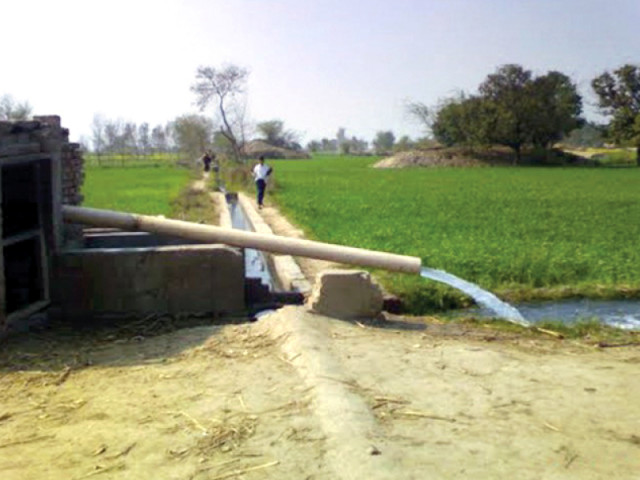Divisible pool of taxes: Centre considering collecting Rs5.4b subsidy at source
Provinces reluctant to pay electricity subsidy for agriculture tube wells.

The federal government is mulling over a plan to collect subsidy at source from provinces by deducting it from the divisible pool of taxes following refusal of provincial governments to contribute their share of electricity subsidy for agriculture tube wells, sources say.
Another plan is also being considered under which the subsidy will be recovered through electricity duty collected by power distribution companies on behalf of provinces.
The move comes as provinces are reluctant to pay general sales tax to subsidise electricity for agriculture tube wells. This arrangement expired on June 30 this year and the centre extended it for one more year to June 2015.
According to the sources, the Ministry of Water and Power issued a notification on August 26 last year announcing tariff subsidy for farmers in line with the decision taken by federal ministers of finance and power in a meeting held with representatives of the Pakistan Kisan Ittehad.

According to the announcement, the federal government would bear the tariff differential and provincial administrations were asked to pay general sales tax.
However, none of the provinces agreed to pay the tax. According to officials of the Ministry of Water and Power, since then tax payments had piled up to Rs7.408 billion, of which Rs5.468 billion was still outstanding. Faisalabad Electric Supply Company (Fesco), however, has adjusted sales tax amounting to Rs1.388 billion against electricity duty collected for the Punjab government in consumer bills.
“Provincial governments should clear the outstanding GST payments as per decision of a meeting held on August 26, 2013 to subsidise electricity for the farmers,” the Economic Coordination Committee (ECC) said in a meeting held on November 20.
In case of non-payment, it was proposed that recoveries would be made through the electricity duty collected by power distribution companies on behalf of provincial governments where applicable or through the federal adjuster.
The ECC also decided to continue the subsidised rate of electricity for agriculture tube wells at Rs10.35 per unit until June 30, 2015 in an effort to provide relief to the farming community. It agreed that the difference between the tariff determined by the National Electric Power Regulatory Authority (Nepra) and the amount charged from consumers would be borne by the Finance Division. However, the provincial governments would again pay general sales tax.
Giving a briefing, some meeting participants said wheat production in Punjab had hit a historic high at 19.47 million tons in financial year 2013-14 on the back of farmer-friendly policies like subsidised electricity at critical stages of crop sowing.
The wheat output added Rs584.1 billion to the national economy, they said and proposed that the subsidy should be extended for one more year to June 30, 2015 as it had left a positive impact on crop productivity.
Published in The Express Tribune, December 10th, 2014.
Like Business on Facebook, follow @TribuneBiz on Twitter to stay informed and join in the conversation.


















COMMENTS
Comments are moderated and generally will be posted if they are on-topic and not abusive.
For more information, please see our Comments FAQ